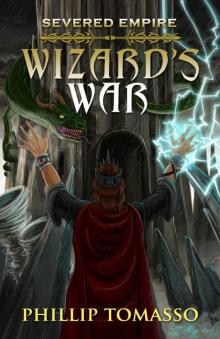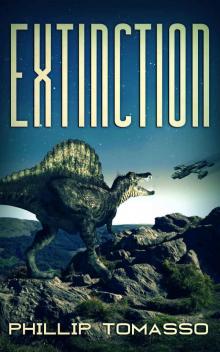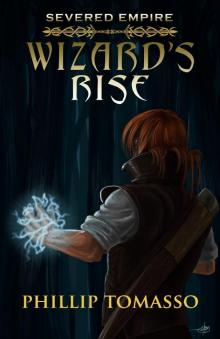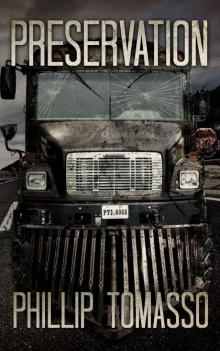- Home
- Phillip Tomasso
Absolute Zero
Absolute Zero Read online
ABSOLUTE ZERO
When a recon becomes a rescue there is nothing absolute!
Phillip Tomasso
Copyright 2017 by Phillip Tomasso
Praise for ABSOLUTE ZERO
"Absolute Zero is classic sci-fi terror in space."—Simon Wood, USA Today bestselling author of The One That Got Away
“Absolute Zero is an outright sci-fi thrill ride that doesn’t let up from the beginning. Tomasso has zeroed in on the perfect blend of supreme action with the foreboding helplessness of the darkest reaches of space. A non-stop page-turner that’s sure to satisfy the need for epic sci-fi adventure.” —Michelle Garza, Co-author of Bram Stoker nominated Mayan Blue
"Reminiscent of Alien, once Tomasso's Neptune gets up to speed, it's a head-down charge to a satisfying conclusion." —Shawn Chesser, author of the Zombie Apocalypse Series
"Great storytelling from the first paragraph. People say a book is hard to put down, but don't mean it. I mean it. This one was hard to put down!" —Jake Bible, Author of Roak: Galactic Bounty Hunter and Z-Burbia.
“A pulse-pounding sci-fi horror novel, Philip Tomasso's ABSOLUTE ZERO takes readers on a thrilling journey to the surface of the Solar System's outermost planet, where dark dangers lurk outside a mining colony. A corporate mission to salvage the operation soon turns lethal, leaving Captain Anara Meyers to wrestle with situations she never expected to find herself in. Meanwhile, a crew of space pirates, seeing an opportunity to loot the colony, lingers nearby. While the book has no shortage of horror thrills and action scenes, it also features some fantastic sci-fi world-building and poignant character moments... not to mention a refreshing number of well-drawn, prominent women characters in positions of leadership. If you like the darker side of sci-fi, I highly recommend you give this one a read.” —Mary Fan, Critically Acclaimed sci-fi author of the Jane Colt series
“Aptly titled, Absolute Zero, will chill your spine. An amazing contribution to the military Science Fiction Genre! Action, running, gunning and plenty of alien monsters to keep readers at the edge of their seat. If you enjoy space marine adventures with all the blood and guts included, then buy this book.” —WJ Lundy Author of Donovan’s War and the Invasion Trilogy
“Phillip Tomasso pens a fast paced sci-fi novel, full of alien landscapes, and far off worlds. But it is so much more than that as he delves into the personalities that comprise the crews of the Eclipse and Cutlass as they do all in their power to save each other from the extreme weather and a hostile race that wants nothing more than their demise. If you're looking for action and a thought provoking, gripping read, you need not venture any farther!” —Mark Tufo, author of the award winning Zombie Fallout Series
This one is for my kids.
For all they do, and
all they have accomplished—
they inspire me!
Prologue
Planet Neptune
Euphoric Enterprises Colony
The alarm sounded, a high-pitched wail combined with a deep honking horn. The warning blared throughout the facility. Gumball lights spun at hallway intersections and above doorways, casting everything, everywhere, in an amber hue.
Sandra Carter ran toward her work area. Her eyes darted this way and that, trying to make sense of the alarms. As the assigned astrophysicist, her fears naturally strayed toward some catastrophic climate issue.
Neptune’s orbit brought the planet close to the sun once every one hundred and sixty-five years. The sun softened ice. Melted it. Although the colony was built on what had been surveyed as land, the temperature change affected everything on the planet.
Flooding?
The colony, built on ice at least three miles thick, should be stable. Had glaciers melted and ocean levels risen? Something like that could prove catastrophic. The colony would be forever buried. Lost.
As she reached her lab, through the glass walls, she saw her assistant. Calvin Friedrichs saw her. He moved for the door. He depressed a button on his side of the wall. The door between them swooshed open. “Sandra, what is going on?”
“I was hoping you could tell me.” Carter stopped at her desk. She thumbed a toggle on the communicator. The screen came to life.
“Yeah?” It was far from a professional response. Ralph Johnson, the mining supervisor, was often anything but. After spending months together, she had grown used to it. He gave her a friendly, if not frantic wave.
“It’s Doctor Carter. Talk to me, Ralph.”
Johnson rolled his eyes. She knew why. She had identified herself, even though he could see her and she him. “Not sure yet,” Johnson said. “Waiting on a body to return. Something happened out there. I’m headed to the storage area now. I got guys screaming bloody murder down there. I can’t make heads or tails of what’s going on.” The mining equipment was large. The machines vacuumed the planet surface. They called the machines The Bodies. The mouth siphoned up whatever was in front of it. The natural diamonds were sucked into the belly, while the snow, grit, and useless layers were discarded as waste out the back end.
“I’ll meet you there,” she said.
“Where are you, the lab? Why don’t you stay there? Let me sort this out. I’m sure it’s no cause for this much alarm. As soon as I find out, I’ll let you know what’s what.”
Sandra Carter wasn’t sure how to proceed. If it were some kind of mining accident, she couldn’t offer much help anyway. Her medical training was limited to bandaging a wound, or splinting a broken bone. Shaking her head, she agreed. “Okay. I’ll wait here. As soon as you figure out what’s—”
“As soon as I figure it out. You have my word.”
Learning early on, Carter was not impressed by taking the supervisor at his word. Oftentimes the smell of alcohol on his breath immediately negated any sincerity in what he said, and, like his speech, his actions were often slurred and stilted. “I’m not joking around, Ralph. The minute you figure out what’s going on, we want to know.”
“I just want to deactivate these alarms first. Have to do that from where they were activated. Should have had a way to silence them from here.” He threw his hands up. “So, give me a few minutes. Okay? I’m going to silence the alarms, and then talk to my crews and see what’s what.”
“And then you call me.”
“Got it. I got it, Doc. Then I call you.” There was a soft beep. The screen went black. He’d ended the transmission from his end. It was his thing, always first to break the connection. That was the other thing. He was a last-word-kind-of-guy.
“What do you think is going on?”
Carter grew increasingly more concerned about Neptune’s orbit around the sun. The closer the planet was to the sun, the more unstable the surface. The more unstable the surface, the more dangerous their mission became. “Could be any number of things. The geysers have been active. Volcanic eruption? Earthquake?”
Friedrichs grinned. “Would you call it that?”
“Call it what?”
“An earthquake. I mean, we’re not on Earth.”
Doctor Sandra Carter sighed, but smiled. “No. I guess you wouldn’t call them earthquakes.”
The sirens quit screaming.
The amber lights stopped spinning.
For a moment, there was silence, and darkness, and then the overhead lights came back on. The lab once again bathed in a soothing, normal, iridescent glow. “There,” Carter said. “That’s much better.”
Maybe it was nothing, she thought. She hoped.
“And what should we do now?” Friedrichs asked, his weight on one leg and arms crossed.
“We get back to the sample testing. Ralph, if he doesn’t have this thing sorted out, will figure out what’s going on and get back to us. You heard him. There’s no reason to le
t whatever’s going on over there impede on our work over here. Agreed?” There were diamonds in need of grading and sorting; ocean and air samples, which required analyzation. At least a dozen other tests needed to be run on ground samples, as well as work with the medic on biometric scans of the colonists for health reasons. The dangerous and dense atmosphere would wreak havoc on a human body. Prolonged exposure guaranteed it.
“You got it, Doc.” Friedrichs leaned forward, over the table. He pressed his eyes against the dual lens on the microscope, his hands spun the turret, and stopped on the objective lens before spinning the coarse and fine focus knobs until the specimen below came into crisp, sharp focus.
Then three things happened almost simultaneously. The main lights went out. The amber lights came back on, and began spinning. Wailing sirens screamed and honked. The alarms reactivated.
Doctor Sandra Carter held up a calming hand. “I’m sure it’s a glitch with the system.”
“What?” Friedrichs held a hand behind his ear.
“I’m sure it is just a problem with the system! It happens sometimes. My grandfather was a fireman, back on Earth. When someone tries resetting an alarm, it triggers. I’m sure that’s all it is.”
Carter was not sure she believed a word she had said. It was all for Calvin’s benefit. Her mind raced. So many things could go wrong; could be wrong. Someone might have gotten seriously hurt. She imagined a suit tear. A miner with exposure. They would be dead almost instantaneously, worst case. Immediate frostbite best case. Damage from a nearby geyser may have burst through the hull of the colony. The geysers were unpredictable. The spray was poison ocean water, and jagged, sharp diamonds shrapnel.
A major air leak. They would all be dead before long if they did not isolate the source and seal off the area.
“Where are you going?” Friedrichs called out.
She could not remain in the lab with the activation of the alarms, a twisting knot in her gut made it near impossible. Carter needed to know what was happening, and if there was anything she could do to help. “Wait here. I’ll be right back!”
_____
Sandra Carter moved down the narrow hallways. The colony was a simple maze. The structures sat on, or were anchored into, what was best perceived as planet land mass and not just frozen ocean. Best recon calculations prior to building the colony also indicated their particular spot was the most stable. There were no reports of volcanic activity in the area, but unpredictable geysers did spot the land.
Before she realized what she was doing, Carter was jogging toward the storage area, maneuvering her way through the corridors. She was well aware of her increased heartbeat, and the sound of her breathing. The anxious knot in her gut now felt as if it had grown teeth and was gnawing at the inner lining of her stomach.
Back when she Euphoric approached her with the idea of trekking out to Neptune for this assignment, she had thought it was like a dream come true. Her lab on the Nebula Way Station was state of the art, and although she received samples for testing from across the galaxy, she jumped at the opportunity to gather the samples herself. Well, since arriving on the planet, she only ventured out with the miners once, but it had been exciting! The vacuuming operation was nothing shy of impressive. Regardless, she was here, on Neptune, working with harvested diamonds first-hand.
Only now, with the ambers flashing and the sirens screaming, did she realize the true level of danger inherently infused into the mission. They were millions of miles from home.
What if something did go wrong?
How would help ever reach them in time?
Okay. She was not naive. She knew a mission of this undertaking ran the risk of becoming potentially perilous. Like a teenager, she supposed, Carter felt invincible when she accepted the assignment.
Carter waved her I.D. in front of the door lock and punched in a four-digit code. The door whooshed open, and Carter charged into the storage area. The giant dome reminded her of ancient Earth films she had watched of sporting events held inside covered arenas. Football, soccer, and baseball. Eighty-thousand plus fans filled stadiums for three to four hours watching while others played a game. She did not get it at first. Streaming old footage, however, she found herself sucked into the excitement, respected the rivalries, and eventually appreciated the competitions.
The dome on Neptune was different, much, much different. There were no stadium bleachers, announcers, or athletes running amuck with a ball. Instead, piles of harvested diamonds filled the storage dome. There were randomly parked black bulldozers and dump trucks.
Then out of the corner of her eye, she saw something else.
Moving, it descended down from the top of a pile of diamonds on her right. Scaled, and slithering, it brought down along with it a rolling landslide of gems. Its footing slipped, and for a moment it rolled toward her, but then it regained balance, control. It continued down the side of the pile as if nothing had happened.
Carter wanted to jump back, get away, but she could not move. She knew she should turn and run and slam closed the storage door on her way out. Instead, she just stood there, her eyes not believing a thing they saw. She could not look away from the thing. Besides, her stiff legs could not feet that suddenly felt cemented in concrete. Her breath caught in her chest. Of all the scans performed there was no evidence suggesting any lifeforms lived on this planet.
When the second thing slalomed down the pile of diamonds on her left, coming at her fast, efficient her immobility spell shattered.
As she ran for the exit, her mind screamed over and over. We’re not alone on Neptune! My God, we’re not safe inside the colony.
PART I
___
The Distress Signal
Chapter One
Aboard the Eclipse
Outside the Reach of Neptune’s Gravitational Pull
Commander Anara Meyers stood with legs shoulder width apart, hands clasped together behind her back. Tall, thin, she kept her dark hair short in the back, long on top, but away from her face with gel. A small nose and high cheekbones accented overtly pale skin, but altogether brought striking contrast against emerald green eyes. Her uniform was crisp, pressed. Her white uniform shirt was tucked into tight, black pants. The royal blue collar indicated her rank.
The bridge, and the entire Eclipse vessel, was under her command. It was not her first flight in charge, however, it was the first with such a large crew, and the failure or success of the mission would greatly impact the future of her career with Euphoric Enterprises, or E.E. The bridge consisted of two tiers. The porthole was floor to ceiling.
The ship now hovered in open space just beyond Neptune’s gravitational pull. With the sun at the ship’s stern, the face of the planet was bright, brilliant blue, and well-lit. The planet, furthest from the sun, had seen some action. The surface had been battered and beaten at some point, surviving past a raining assault committed by a passing belt of asteroids. You wouldn’t know it to look at the smooth, almost glassy surface of the planet from the space just beyond its moons. Neptune was, indeed, a remarkable sight.
Neptune’s magnetic field is tipped on its side in relation to the axis the planet rotates around. At a forty-seven degree angle, the axis is not positioned at north and south, but east and west. The planet did not spin so much as roll. Additionally, the meteor-sized ice crystals which formed rows of thin rings, circled around the blue planet more from top to bottom instead of as if a belt racing around the center.
Although Neptune possessed fourteen moons, Commander Anara saw only two from where she stood on the bridge. Nearly seventeen times the mass of Earth, the planet’s mammoth girth blocked from view the remaining moons on their orbits.
Commander Meyers had enlisted in the North American Alliance Armada (NAAA) immediately after school. After completing her fourth year, she had planned a life-long career with the military branch, just like her father and grandfather had done. However, E.E. came at her hard. On the table, the company offered a nearly qu
adrupled salary over what the NAAA paid her, an amazing pension plan, and profit sharing. Then there was the promise of immediate promotion from lieutenant to commander, and as an added benediction, they wooed her with the allure of a position that would place her in charge of the Eclipse, their newest, state-of-the-art, high-tech starship. Meyers did not know of a single commander, or lieutenant, or any officer for that matter, who did not dream of flying the Eclipse.
Her decision still had not been simple. E.E. gave her time to consider the options, which was thoughtful. She knew if she hesitated too long the opportunity would be snatched out from under. While making a call on the fly was a talent she possessed, leaving the NAAA for employment with E.E. required something more than a split decision. She was thankful they removed added pressure. In her heart, she knew she wanted the new position. Her mind was what kept her from immediately accepting. It made lists for her. Pros. Cons. These were things her heart failed at when contemplating decisions. The first person she called with the news about the job offer was the last person she wanted to discuss it with—her father, Retired Admiral Matthew Meyers.
Lt. Mark Windsor, her First Officer, sat beside the ship’s Conn Officer, Robert Bachand. The two manipulated an array of touch-screen controls on a continuous, wide, flat, yet curved panel. The ship ran from the controls on the board, the throttle for engine speed and direction, ship and galactic communications, life support and weapons.
Neptune filled the view from the porthole high-temperature quartz glass. The rings were portside. Mass amounts of ice crystal debris, moving fast, orbited the planet. The passing shards seemed almost violent and treacherous passing beyond the glass of the bridge porthole, while the planet surface misleadingly resembled something more tranquil, and was blue with a sparse spattering of white clouds.

 Severed Empire: Wizard's War
Severed Empire: Wizard's War Vaccination - 01
Vaccination - 01 Extinction
Extinction Johnny Blade
Johnny Blade Severed Empire: Wizard's Rise
Severed Empire: Wizard's Rise Evacuation - 02
Evacuation - 02 Absolute Zero
Absolute Zero Arcadia (Book 1): Damn The Dead
Arcadia (Book 1): Damn The Dead Preservation - 03
Preservation - 03